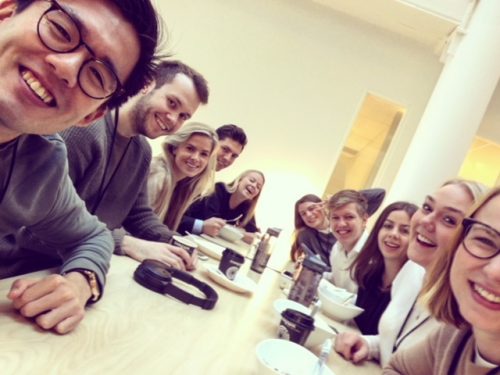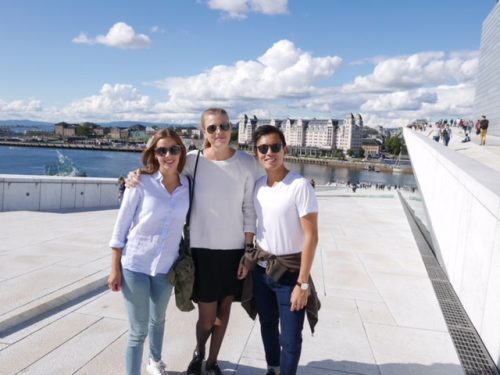I’m now halfway in on the last project of my management trainee year. As a management trainee at Visma I can assure you that you will quickly become a project manager, therefore I thought it would be a great opportunity for me to share some of my experiences about project management.
My projects have been quite different, so I have been approaching and executing them in different ways, but there are some common methods that I stick to no matter what kind of project it is. But first let us start by looking at – Why is it important with project management?
Good project management can generate positive change for a company, it can increase efficiency and reduce the risk of surprises. Good project management means that companies can allocate and use their resources in a better way. As a project manager at Visma you get a unique opportunity to gain a broad knowledge about different areas of the company. You will also be able to increase your understanding of the business and the various products and services offered by the company. All of this sounds great, but – How do you become a great project manager at Visma? This is a very difficult question to answer but I have created a top ten list for project management success.
My top 10 list
1. When starting a new project one of the first things I have done is to schedule a start-up meeting with my project owner (the person who initially requested the project) where we have discussed questions such as: What’s the background of the project? Why is this project needed? What are the overall tasks? What are the project owner’s expectations on the project? How would a successful outcome look like? And maybe the most important question, which I also often find the most difficult – what is the project scope? All these questions are discussed in order to ensure that my project owner and I are fully aligned with regards to what the outcome should be.
a) Determining the project scope can be very challenging since projects can develop and take different directions depending on the findings along the way and for that reason, it can be hard to agree on the exact scope from inception. If the scope starts to become unclear, it is important to remember the overall purpose of the project. During University, I had a similar issue when working on my master’s thesis. At one point I had to cut down the total number of words. In order to achieve the best result and to ensure that all the text of the thesis was within the scope, I wrote down my research question on a piece of paper and had it next to my computer when I was reading through my thesis. When I came to a section that was not contributing to answering my research question, I simply deleted that section. You could use the same technique for your project when collecting information. Ask yourself, will this new information help you to reach the project goal and achieve the purpose of the project? If not, you should probably not delete it as I did in my thesis but you could have it in a separate folder. That information could help you when trying to figure out the next steps after your project.
2. Write a project plan where you try to break down the project in different phases. These phases will probably be overlapping but I believe it is satisfying to get an overlook of the project and what needs to be accomplished. Determine what kind of methods you will use and what the result will be. Go through the project plan with your project owner, do you agree on the different bullet points?
3. Follow up on this and have recurring status meetings with your project owner. These can take place once a week. Try to be as structured as possible e.g. by using PP slides that both of you can look at during the meetings. Bring up bullet points such as: What have I been doing so far? (or since last status meeting), what should I accomplish this week? You might want to go through the information you have received or discuss bottlenecks. Because in every project you will run into at least one bottleneck. If you look at it positively – you will always manage to squeeze through them, but no, they are not pleasant. If you believe that the status meetings are not enough and you have a project that is covering a lot of different areas it could be a great idea to put together a steering group with individuals from the different areas.
4. Leading a project is not always an easy task, the projects are often complex and with many people involved. We all know that dealing with people is challenging, the people involved in the projects have different positions and can therefore, have different agendas. For that reason, it is important to remember who your project owner is and again – what is the purpose of the project?
5. Since you will likely receive a large amount of information and emails during at the project, it is important to have a smart way of structuring the information. I have ensured to always have the files structured in a way which makes it easy for me to find the various files that I work with by using a good folder structure.
a) I use the “empty inbox” technique to organize incoming emails meaning that my mailbox is almost always empty when I leave the office for the day. I use different folders such as Project 1,2,3, Administration, Other etc. Even though I agree with the no sayers on that – “Investing too much energy in any organizing system is just time consuming”, I believe that an empty inbox saves a lot of time both for myself and for my colleagues. There is less risk that I miss to follow up on an important email, I find old emails and information much easier (the searching tool is not great) and the feeling when the inbox is empty is too good to resist!
b) Use a notepad, yes it is a very old school advice, I agree. But I have noticed that often when you are on the way out of the meeting or interview, the person drops a really great comment or that your project owner suddenly remembers an important thing. I always bring a notepad so I can quickly write it down and not forget the details.
6. As a management trainee, you will quickly get a large network of contacts by people involved in the different projects and previously management trainees. Use these contacts and reach out to people when you get stuck or when you need more information concerning the project. Often you realize things just by describing your problem out loud for another person. Book meetings with people who are directly or indirectly involved in the project and describe your project for them, it can really take the project to the next level.
a) Another thing is to attend events and seminars that are connected to your project. It is a great way to gain new insight and ideas. You would be surprised how much other companies share new ideas, I guess it is because the hard thing is often to know how to execute the ideas, and who knows, you might have a better idea on how to do that.
7. Record important meetings/interviews regarding your projects (but don’t forget to ask first). This has been a trainee saver for me! I’m able to be much more involved in the meetings and interviews when my phone is recording. There are enough distractions as it is during an interview.
8. Don’t start too late with preparing your final presentation! I did that on my first project, which resulted in much less “fikor” (coffee breaks) during the last two weeks. Try also to document your information as clearly as possible. At Visma I believe we are very good at sharing information and the outcome of the management trainee projects is something that will get used by many employees so the chances that someone who did not attend your final presentation will read your PP slides are quite high. For that reason, it is also a good advice to ensure that your slides can speak for themselves, or that you use the notes function underneath the slides.
a) Receive feedback by presenting your final presentation for your management trainees colleagues. Which parts were unclear? Which parts were unnecessary?

9. It is so important to have good communication (now you are making the sound – duh!). But why is it then so common with miscommunication? One reason could be that a lot of communication in our daily work is through emails and text. There is always a risk of confusion then, so take those extra seconds and write out, for example, the date and time one more time so you don’t misunderstand each other.
a) My absolutely favorite keyboard shortcuts, which helps me a lot in my communication, is: Windows (the flag symbol) +Shift + S. My first project owner taught me this and I use it almost every day. If there is some tiny risk of confusion in your email, paste in a picture (it might not always be possible) which could help the recipient to easier understand your question.
b) Be the owner of the decision – when communicating with a person who you need an answer from and they reply – that’s great, let us keep in touch – reply back with a “Thanks! I will get back to you to follow up at the end of next week”. Don’t forget to be stubborn!
10. Dare to challenge, don’t be afraid to share your ideas, even if you believe they are crazy, and also question why things are done the way they are. In my experience so far at Visma, people always appreciate it.

To conclude, project management is challenging but it is also very exciting. It has helped me a lot during the year to be structured, to focus on the solutions and to reach out to people. The year has gone by too fast and I wish I could to it all over again. So don’t forget to enjoy your time as a project manager, have fun and appreciate all the help you will get from people around you!




